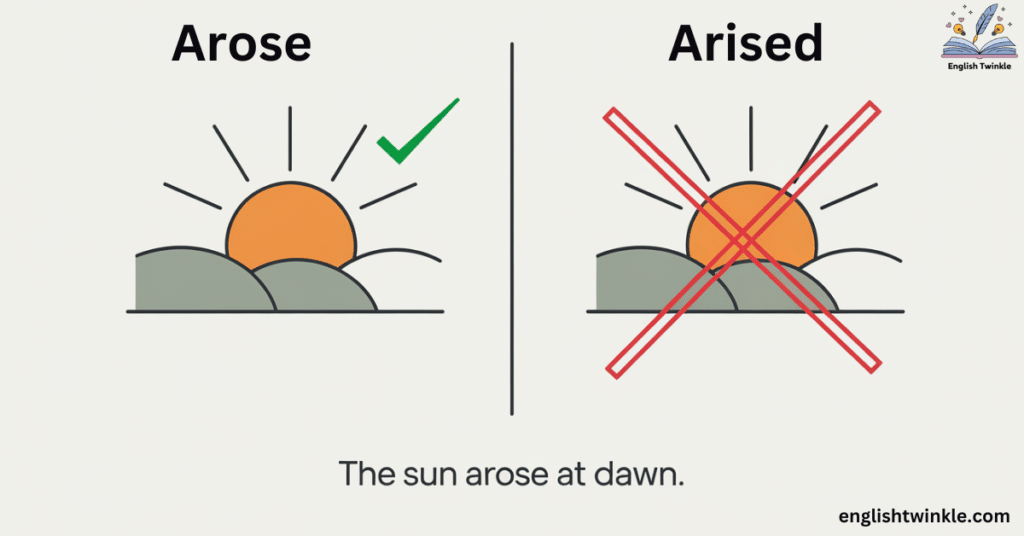Have you ever found yourself scratching your head, wondering whether to use “arose” or “arised” in a sentence? You’re not alone. The past tense of arise has been a source of confusion for many English speakers, both native and non-native alike. In this comprehensive guide, we’ll delve into the intricacies of this irregular verb, explore its various forms, and equip you with the knowledge to use it confidently in your writing and speech.
The Rise of Confusion: Why “Arise” Trips Us Up
“Arise” is one of those pesky irregular verbs that doesn’t follow the standard rules of conjugation. While most verbs simply add “-ed” to form their past tense, “arise” takes a different path. This uniqueness is often the root of the confusion surrounding its correct usage.
Many writers, even seasoned ones, sometimes falter when it comes to using “arise” in its past tense form. The temptation to add “-ed” and create “arised” is strong, but it’s a path that leads to grammatical error. Let’s clear up this misconception once and for all: “Arised” is not the correct past tense of arise.
The confusion stems from our natural inclination to apply regular verb rules universally. After all, we say “surprised,” “compromised,” and “exercised,” so why not “arised”? This cognitive dissonance between what feels right and what is grammatically correct creates a stumbling block for many English learners and even native speakers.
Arise: More Than Just Getting Out of Bed
Before we dive deeper into the past tense conundrum, let’s take a moment to understand what “arise” actually means. This versatile verb has several meanings and can be used in various contexts:
- To get up from a lying or sitting position
- To come into existence; to originate
- To occur or become apparent
- To ascend or move upward
Here’s a comprehensive table to illustrate these meanings with examples:
| Meaning | Example Sentence | Synonym |
|---|---|---|
| To get up | The sun arose, and John arose from his bed. | Rise |
| To come into existence | New challenges arose as the project progressed. | Emerge |
| To occur | The need for a new policy arose after the incident. | Develop |
| To ascend | A cloud of smoke arose from the chimney. | Rise up |
| To become apparent | A smile arose on her face as she read the letter. | Appear |
It’s important to note that “arise” differs from its simpler cousin “rise” in subtle ways. While “rise” often refers to a physical upward movement, “arise” frequently implies the emergence or occurrence of something more abstract.
The Correct Past Tense: Arose
Now, let’s address the elephant in the room: the correct past tense of arise is arose. This might seem counterintuitive at first, but it’s a rule that’s been ingrained in the English language for centuries.
Here’s a breakdown of the conjugation:
- Present tense: arise, arises
- Past tense: arose
- Past participle: arisen
- Present participle: arising
Let’s see these forms in action:
- Present: I arise early every morning.
- Past: The sun arose at 6:00 AM yesterday.
- Past participle: New opportunities have arisen in the tech industry.
- Present participle: Issues are arising from the new policy.
Understanding this conjugation is crucial for avoiding common mistakes and using the verb correctly in all its forms.
Why “Arised” is a Common Mistake

The allure of “arised” comes from our natural tendency to apply regular verb rules to all verbs. After all, we say “surprised,” “compromised,” and “exercised,” so why not “arised”?
But English, with its myriad influences and historical quirks, doesn’t always play by its own rules. “Arise” belongs to a group of irregular verbs that change their vowel sounds to form the past tense, rather than adding “-ed”. Other examples include:
- Ride → Rode
- Write → Wrote
- Drive → Drove
- Sing → Sang
- Ring → Rang
- Begin → Began
Understanding this pattern can help you remember that “arose” is the correct form. These verbs, known as strong verbs, have their roots in Old English and have retained their irregular conjugations over time.
The Evolution of Arise: A Journey Through Time
To truly appreciate the peculiarities of “arise,” we need to take a trip back in time. The verb has its roots in Old English, where it appeared as “ārīsan.” This ancient form already contained the seeds of its modern irregular conjugation.
Over the centuries, as English evolved through Middle English and into Modern English, “arise” retained its irregular status. This persistence is a testament to the word’s frequent use and importance in the language.
Here’s a brief timeline of “arise”:
- Old English (before 1100 CE): ārīsan
- Middle English (1100-1500 CE): arisen
- Early Modern English (1500-1800 CE): arise
- Modern English (1800-present): arise
This historical perspective helps explain why “arise” doesn’t conform to the regular “-ed” rule for past tense formation. It’s a linguistic fossil, preserving ancient patterns of verb conjugation that have largely disappeared from modern English.
Mastering Arise: A Tense-by-Tense Guide
To fully grasp the usage of “arise,” let’s break it down tense by tense:
Present Tense
- Simple Present: I/You/We/They arise, He/She/It arises
- Present Continuous: I am arising, You/We/They are arising, He/She/It is arising
- Present Perfect: I/You/We/They have arisen, He/She/It has arisen
- Present Perfect Continuous: I/You/We/They have been arising, He/She/It has been arising
Past Tense
- Simple Past: I/You/We/They/He/She/It arose
- Past Continuous: I/You/We/They/He/She/It was arising
- Past Perfect: I/You/We/They/He/She/It had arisen
- Past Perfect Continuous: I/You/We/They/He/She/It had been arising
Future Tense
- Simple Future: I/You/We/They/He/She/It will arise
- Future Continuous: I/You/We/They/He/She/It will be arising
- Future Perfect: I/You/We/They/He/She/It will have arisen
- Future Perfect Continuous: I/You/We/They/He/She/It will have been arising
Understanding these various forms allows for precise expression of when an action occurs, its duration, and its relationship to other events in time.
Pronunciation Guide: Say It Right

Proper pronunciation can make a world of difference in how you use “arise” and its past tense form. Let’s break it down:
- Arise: /əˈraɪz/ (uh-RIZE)
- Arose: /əˈroʊz/ (uh-ROZE)
- Arisen: /əˈrɪzən/ (uh-RIZ-en)
The key difference lies in the second syllable. In “arise,” it’s pronounced like the word “rise.”, “arose,” it sounds more like “rose.” In “arisen,” the second syllable is pronounced like the “i” in “hit.” Mastering these distinctions will boost your confidence in using these words in spoken English.
Common mispronunciations to avoid:
- Don’t say “a-REEZ” for arise
- Avoid pronouncing “arose” as “a-ROOZ”
- Don’t say “a-RYE-zen” for arisen
Practice these pronunciations regularly to internalize them and use them naturally in conversation.
Arise in Action: Real-world Examples
To truly understand how “Arised or Arose” function in everyday language, let’s look at some examples from various contexts:
Literature and Famous Quotes
- “I arose in the morning, and descended to the sitting room in a state of utter uncertainty.” – Jane Austen, “Sense and Sensibility”
- “The sun arose upon an altered world.” – Mary Shelley, “The Last Man”
- “And the man and woman came out of their shelter and saw a fair new world about them. The sun arose on the first day of the first year of a new world.” – H.G. Wells, “The World Set Free”
- “Hope is the thing with feathers that perches in the soul – and sings the tunes without the words – and never stops at all.” – Emily Dickinson (Here, “perches” could be replaced with “arises” to illustrate our point)
News Headlines
- “New Concerns Arose Over Climate Change Impact”
- “Economic Opportunities Arise from Technological Advancements”
- “Questions Arise About the Effectiveness of New Education Policy”
- “Tensions Arose Between Nations Following Diplomatic Misstep”
Business and Legal Contexts
- “The need for a new marketing strategy arose after the competitor’s product launch.”
- “Any disputes that arise from this contract shall be settled through arbitration.”
- “Unforeseen challenges arose during the merger, necessitating a reevaluation of the timeline.”
- “The board will address any issues that arise during the annual shareholders’ meeting.”
Everyday Usage
- “A misunderstanding arose between the roommates over household chores.”
- “An opportunity to travel abroad arose unexpectedly.”
- “The idea for the novel arose from a vivid dream the author had.”
- “Concerns about data privacy have arisen in recent years with the growth of social media.”
These examples demonstrate the versatility of “arise” and its past tense form “arose” across various domains, from literature to business, news, and everyday communication.
Synonyms and Related Words: Expanding Your Vocabulary
While “arise” is a powerful verb in its own right, knowing its synonyms can help you vary your language and express nuances more effectively. Here’s a comprehensive table of synonyms for both “arise” and “arose,” along with example sentences:
| Present Tense | Past Tense | Example Sentence |
|---|---|---|
| Arise | Arose | |
| Emerge | Emerged | A new theory emerged from the research. |
| Occur | Occurred | The accident occurred at the intersection. |
| Appear | Appeared | A solution appeared just in time. |
| Develop | Developed | Complications developed during surgery. |
| Surface | Surfaced | New evidence surfaced in the case. |
| Originate | Originated | The custom originated in ancient times. |
| Spring up | Sprang up | Protests sprang up across the country. |
| Crop up | Cropped up | Unexpected issues cropped up during the project. |
| Materialize | Materialized | The promised funding never materialized. |
| Come about | Came about | The change came about gradually. |
| Come to light | Came to light | The truth finally came to light. |
| Manifest | Manifested | Symptoms manifested a week after exposure. |
When choosing between “arise” and its synonyms, consider the context and the specific shade of meaning you want to convey. For instance, “emerge” might be more appropriate when describing something coming into view, while “occur” might better fit situations describing events or happenings.
Common Pitfalls and How to Avoid Them
Even with a solid understanding of “arise” and its forms, there are still some common mistakes that writers and speakers often make as it is difficult to know which is correct “Arised or Arose”. Here are a few to watch out for:
- Confusing “arise” with “raise”: While they sound similar, these verbs have different meanings. “Raise” typically means to lift or elevate something, while “arise” means to come into existence or to get up.
- Incorrect: The manager raised a concern during the meeting.
- Correct: A concern arose during the meeting.
- Mixing up “arose” and “arisen”: Remember, “arose” is the simple past tense, while “arisen” is the past participle used with helping verbs.
- Incorrect: The issue has arose recently.
- Correct: The issue has arisen recently.
- Using “arised”: This is never correct. Always use “arose” for the simple past tense.
- Incorrect: The problem arised unexpectedly.
- Correct: The problem arose unexpectedly.
- Confusing “arise” with “rise”: While related, these verbs have slightly different uses. “Arise” often implies the emergence of something abstract, while “rise” typically refers to upward movement.
- Incorrect: The sun arises in the east. (While not entirely wrong, it’s less common)
- Correct: The sun rises in the east.
- Incorrect use in passive voice: “Arise” is an intransitive verb and doesn’t have a passive form.
- Incorrect: The issue was arisen by the committee.
- Correct: The issue arose during the committee meeting.
By being aware of these common pitfalls, you can avoid them in your own writing and speech, thus using “arise” and its forms with greater accuracy and confidence.
The Arise Challenge: Test Your Knowledge
Now that we’ve covered the ins and outs of “arise,” let’s put your knowledge to the test with a comprehensive quiz:
- Fill in the blank: New challenges _ during the project.
- Choose the correct form: The sun had (arose/arisen) before we left.
- Is this sentence correct? “The need for change arised suddenly.”
- What’s the present participle of “arise”?
- In the sentence “She _ to the occasion,” should you use “arose” or “risen”?
- Complete the sentence: “If any problems _, please let me know immediately.”
- Which is correct: “The issue was arose” or “The issue arose”?
- What’s the third-person singular present tense of “arise”?
- Fill in the blank: “By the time we reached the summit, the fog had _.”
- Is “arise” transitive or intransitive?
Answers:
- arose
- arisen
- No, it should be “arose”
- arising
- rose (note: “arise” isn’t typically used in this idiom)
- arise
- The issue arose
- arises
- arisen
- Intransitive
How did you do? If you got 8 or more correct, you’re well on your way to mastering “arise”!
Beyond English: “Arise” in Other Languages
It’s fascinating to see how other languages handle concepts similar to “arise.” While the exact equivalents may vary, many languages also have irregular verbs that pose similar challenges to learners.
Here’s a table showing how “arise” translates in various languages, along with their past tense forms:
| Language | Present Tense | Past Tense | English Translation |
|---|---|---|---|
| French | se lever | s’est levé | to get up |
| German | stehen | entstand | to come into being |
| Spanish | surgir | surgió | to arise, emerge |
| Italian | sorgere | è sorto | to arise, emerge |
| Russian | возникать (voznikat’) | возник (voznik) | to arise, emerge |
| Japanese | 起こる (okoru) | 起こった (okotta) | to occur, arise |
| Mandarin | 出现 (chūxiàn) | 出现了 (chūxiàn le) | to appear, arise |
This universality of irregular verbs across languages highlights the complexity and richness of human communication. It also underscores the importance of understanding these irregular forms, as they often represent core concepts that are frequently used in language.
The Impact of “Arise” in Different Fields

The versatility of “arise” makes it a valuable word in various professional and academic fields. Let’s explore how it’s used in different contexts:
In Law
In legal language, “arise” is often used to describe the occurrence of legal issues or the origin of legal rights and obligations. For example:
- “The court will hear all cases arising from the new legislation.”
- “Any disputes that arise under this contract shall be settled by arbitration.”
In Business
Business professionals use “arise” to discuss emerging opportunities, challenges, or changes in the market. For instance:
- “New market opportunities have arisen due to technological advancements.”
- “The need for restructuring arose after the merger.”
In Science
Scientists might use “arise” when discussing the emergence of new phenomena or the development of theories:
- “Questions arose about the validity of the experiment’s results.”
- “A new hypothesis has arisen from the latest observations.”
In Philosophy
Philosophers often employ “arise” when exploring the origins of ideas or the emergence of consciousness:
- “The concept of free will arises from our sense of agency.”
- “Ethical dilemmas often arise when technology outpaces moral considerations.”
Understanding how “arise” is used in these different fields can help you employ it more effectively in your own professional or academic writing.
Conclusion: Rising to the Occasion
Mastering the use of “arise” and its past tense “arose” is more than just a grammatical exercise. It’s about precision in communication, about expressing yourself clearly and confidently in both writing and speech.
Remember these key points:
- The correct past tense of “arise” is “arose,” not “arised”
- “Arise” is an irregular verb with roots in Old English
- The pronunciation difference between “arise” and “arose” is subtle but important
- Context is crucial when choosing between “arise” and its synonyms
- “Arise” has specific uses and connotations in various professional fields
- “Arose” is the correct past tense of “arise,” not “arised.”
- “Arised” is a common mistake; always use “arose” in past tense contexts.
- “Arise” is an irregular verb, changing to “arose” (past) and “arisen” (past participle).
- Remember: I arise, I arose, I have arisen – never use “arised.”
- When in doubt between “arised or arose,” choose “arose” for grammatical correctness.
By internalizing these rules and practicing their application, you’ll find that using “arise” correctly becomes second nature. You’ll be able to describe emerging situations, recount past events, and express abstract concepts with accuracy and flair.
So the next time you need to use “arise” in its past tense in the case of “Arose vs. Arised” , don’t hesitate. Let your confidence arise, knowing that you’ve mastered this tricky but essential aspect of the English language. Whether you’re writing a business report, crafting a legal document, or engaging in casual conversation, you’ll be well-equipped to use “arise” and its forms with precision and style.
sources
These sources provide comprehensive information on English grammar, including irregular verbs like “arise,” their historical development, and their usage in various contexts.
Merriam-Webster. (2023). “Arise.” In Merriam-Webster.com dictionary.
Oxford English Dictionary Online. (2023). “arise, v.” Oxford University Press.
Crystal, D. (2003). The Cambridge Encyclopedia of the English Language. Cambridge University Press.

Freck John, linguist and English educator, shares grammar insights and writing tips at English Twinkle, making language concepts accessible to all learners.







